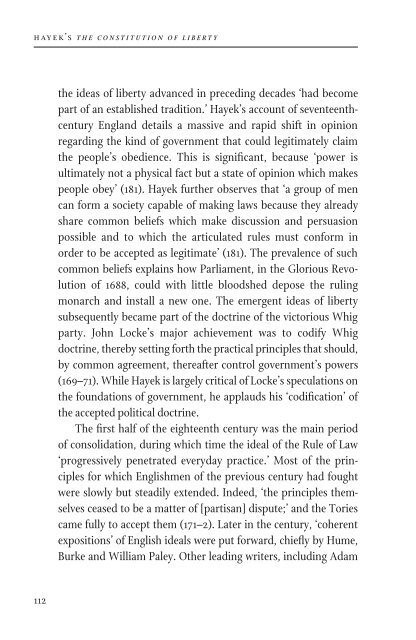Hayek's The Constitution of Liberty - Institute of Economic Affairs
Hayek's The Constitution of Liberty - Institute of Economic Affairs
Hayek's The Constitution of Liberty - Institute of Economic Affairs
You also want an ePaper? Increase the reach of your titles
YUMPU automatically turns print PDFs into web optimized ePapers that Google loves.
h ay e k ’ s t h e c o n s t i t u t i o n o f l i b e r t y<br />
o r i g i n s a n d d e v e l o p m e n t o f t h e r u l e o f l aw<br />
the ideas <strong>of</strong> liberty advanced in preceding decades ‘had become<br />
part <strong>of</strong> an established tradition.’ Hayek’s account <strong>of</strong> seventeenthcentury<br />
England details a massive and rapid shift in opinion<br />
regarding the kind <strong>of</strong> government that could legitimately claim<br />
the people’s obedience. This is significant, because ‘power is<br />
ultimately not a physical fact but a state <strong>of</strong> opinion which makes<br />
people obey’ (181). Hayek further observes that ‘a group <strong>of</strong> men<br />
can form a society capable <strong>of</strong> making laws because they already<br />
share common beliefs which make discussion and persuasion<br />
possible and to which the articulated rules must conform in<br />
order to be accepted as legitimate’ (181). <strong>The</strong> prevalence <strong>of</strong> such<br />
common beliefs explains how Parliament, in the Glorious Revolution<br />
<strong>of</strong> 1688, could with little bloodshed depose the ruling<br />
monarch and install a new one. <strong>The</strong> emergent ideas <strong>of</strong> liberty<br />
subsequently became part <strong>of</strong> the doctrine <strong>of</strong> the victorious Whig<br />
party. John Locke’s major achievement was to codify Whig<br />
doctrine, thereby setting forth the practical principles that should,<br />
by common agreement, thereafter control government’s powers<br />
(169–71). While Hayek is largely critical <strong>of</strong> Locke’s speculations on<br />
the foundations <strong>of</strong> government, he applauds his ‘codification’ <strong>of</strong><br />
the accepted political doctrine.<br />
<strong>The</strong> first half <strong>of</strong> the eighteenth century was the main period<br />
<strong>of</strong> consolidation, during which time the ideal <strong>of</strong> the Rule <strong>of</strong> Law<br />
‘progressively penetrated everyday practice.’ Most <strong>of</strong> the principles<br />
for which Englishmen <strong>of</strong> the previous century had fought<br />
were slowly but steadily extended. Indeed, ‘the principles themselves<br />
ceased to be a matter <strong>of</strong> [partisan] dispute;’ and the Tories<br />
came fully to accept them (171–2). Later in the century, ‘coherent<br />
expositions’ <strong>of</strong> English ideals were put forward, chiefly by Hume,<br />
Burke and William Paley. Other leading writers, including Adam<br />
Smith and William Blackstone, took these ideals for granted, but<br />
largely refrained from stating them explicitly (172–4).<br />
England’s major contribution to the evolution <strong>of</strong> the principles<br />
<strong>of</strong> freedom ended with the close <strong>of</strong> the eighteenth century.<br />
Its achievements were mostly preserved beyond the nineteenth<br />
century, but there was little further development <strong>of</strong> underlying<br />
ideals, even in the writings <strong>of</strong> historians such as T. B. Macaulay<br />
and <strong>of</strong> economists in the Smithian tradition. <strong>The</strong>re emerged a<br />
new, constructivist liberalism, <strong>of</strong>ten guided by the ideals <strong>of</strong> the<br />
French Revolution, which scorned Britain’s received constitution<br />
and proposed ‘to remake the whole <strong>of</strong> her law and institutions on<br />
rational principles.’ Here Hayek mentions Bentham and the Utilitarians<br />
as well as the moralist and radical pamphleteer Richard<br />
Price. From this point forward the English ideal <strong>of</strong> individual<br />
liberty was progressively displaced, even in Great Britain, by ‘the<br />
essentially French concept <strong>of</strong> political liberty’ (174–5).<br />
America’s contribution<br />
<strong>The</strong> colonists who settled America brought with them the principles<br />
<strong>of</strong> individual freedom that had developed in England,<br />
including ‘the conception that no power should be arbitrary and<br />
that all power should be limited by higher law’ (177). What Americans<br />
added was an insistence on a fixed constitution, a written<br />
document that recognises fundamental principles and organises<br />
government around them. This conviction – that the protection<br />
<strong>of</strong> freedom requires a written constitution – was rooted in<br />
America’s early experience with compacts and charters. It found<br />
expression in the various state constitutions that were established<br />
during and after the Revolution, and it stimulated efforts to draft<br />
112<br />
113












